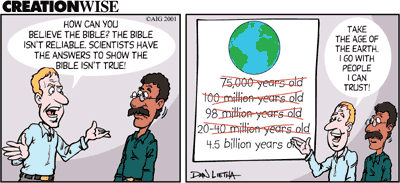(In no particular order)
 1 – God was the only one present “in the beginning” to give a testimony of the “what,” “when,” and “how” (Gen.1:1) and has in fact done so.
1 – God was the only one present “in the beginning” to give a testimony of the “what,” “when,” and “how” (Gen.1:1) and has in fact done so.2 – Genesis 1 describes one week of seven consecutive days of creation and not great ages or vague periods of time.
3 – Genesis 1 describes creation in reference to “kinds” that recreate after themselves and not evolutionary development, thus no necessary length of time between the various creatures in order to evolve.
4 – Genesis 5 gives a very precise chronological genealogy between Adam and Noah; and Genesis eleven gives another very precise chronological genealogy between Noah and Abraham (Abraham can be dated to some time around 1800-2000 BC). Any suggestion of “gaps” in names does not account for gaps in time since exact times between births and deaths are recorded.
5 – Genesis 6-8 describe a global catastrophe that more adequately accounts for the fossil record in opposition to the evolutionary suggestion of uniformitarianism (everything happened the same over time and there was no particular global catastrophe).
6 – Jesus lineage in Luke 3 traces from Jesus back to Adam treating the genealogies of the Old Testament as authentic historically.
7 – The various dating methods (radio-carbon, light travel, etc.) used by modern science presuppose vast ages and uniform decay and also that creation wasn’t already mature in the beginning. This discounts the obvious “maturity” of everything that was created (i.e., man and woman, animals and plants that are expected to begin reproducing, stars that are already in place and shining at various brightnesses and varying distances).
 8 – The order of creation in Genesis one suggests a completely different order for creation than evolutionary theories involving great ages. Light appears before anything. The plants are created before the sun. Birds and fish are created simultaneously and the one does not evolve from the other, but create “after their own kind”.
8 – The order of creation in Genesis one suggests a completely different order for creation than evolutionary theories involving great ages. Light appears before anything. The plants are created before the sun. Birds and fish are created simultaneously and the one does not evolve from the other, but create “after their own kind”.